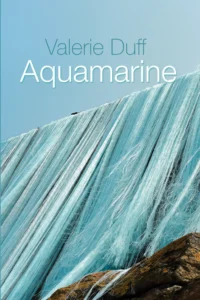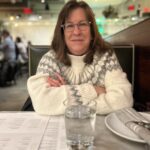Poet Valerie Duff is chatting with me about her new poetry collection entitled Aquamarine.

Bio:
Valerie Duff’s first book, To the New World (Salmon Poetry, 2010), was shortlisted for the Seamus Heaney First Collection Poetry Prize from Queens University, Belfast. Aquamarine was published by Lily Poetry Review Press in 2023. Valerie has held fellowships from the VCCA and Writers’ Room of Boston. Her poems have appeared in AGNI, POETRY, Ploughshares, The Common, Great River Review, and elsewhere. She works as a writer in Alumni Relations and Resource Development at Harvard Kennedy School. Valerie can’t wait to travel to see her first live F1 race this summer with her son (although she prefers Fe).
Welcome, Valerie. What do you enjoy most about writing poems?
Finishing them! (While that is my truthful answer, I love being immersed in the process of writing poems—that moment when you look up and hours have gone by and you’ve been playing with words to build something very small and very precise, even if it might have to be completely overhauled tomorrow.)
Can you give us a little insight into a few of your poems – perhaps a couple of your favorites?
Sure—I wrote the opening poem of Aquamarine, “Music of the Spheres,” when I was in a rut, writing poem after poem about growing up in Virginia. At some point, I got bored with my own work and set myself the task of writing about some other part of my life—and settled on a weekend trip I took to Italy (my first and only) on my 31st birthday. I had arranged the solo weekend trip because I wanted to buy my husband’s wedding ring in Florence (I was living in Ireland at the time, so it wasn’t necessarily as crazy as it sounds)—but my engagement and the ring aren’t really apparent in the poem. Many of my poems are serious, and while “Music of the Spheres” has its serious moments, I let myself play with everything I was thinking and feeling: “I staggered out, an accordion, wondering/how to make a compound sentence,//where gelati, where some money,/why the best phrase I could muster/in Italy was: mi lasci in pace…”
Internal rhyme is very important to me. Another poem of mine that I like is “Arrowhead” (about Herman Melville’s home in Pittsfield, Massachusetts). The lines ride on sound. I wanted to capture my amazement that the brilliant nautical masterpiece Moby Dick was written in sight of a mountain (Mt Greylock) in Western Mass, and I suppose at one time one could have found arrowheads on the land around the house:
No evidence of whaling but in weaponry
thrown overboard, small and dire, beyond
the fireplace that warmed each floor, dark desk
of glacial spruce whose print seeks wilderness.
What form are you inspired to write in the most? Why?
I am always inspired by and gravitate towards the sonnet, even if I ultimately end up breaking my own. It’s such a contained and perfect form, and yet an incredible amount of movement happens inside that box. I read lots of Robert Lowell as a teenager and was always struck by his modern sonnets. And my favorite poet is still Gerard Manley Hopkins—his sonnets are hands-down the best.
What type of project are you working on next?
While Aquamarine and To the New World are very different from each other, I would like to branch out even more in my third book—I’ve often wondered if I have it in me to work on a manuscript made up entirely of prose poems or a crown of sonnets or around a specific theme. I wouldn’t mind giving myself some tighter boundaries in the next one, just to see what happens.

When did you first consider yourself a writer / poet?
I’ve always identified as a writer, but I think I first thought of myself a poet when I heard a teacher read Delmore Schwartz’s “Dogs Are Shakespearean, Children Are Strangers” to the class when I was in my twenties. I remember feeling absolutely possessed by the sound of it, and I realized that I wanted to do that—and that was all I wanted to do. I went home and memorized that poem and knew I wanted to make words do that—take over a moment and change someone—not as therapy or communication, but as a core experience or fundamental truth transferred from one person to another. So maybe it’s more accurate to say that that’s when I first considered that I wanted to be a poet, which is where I am, still, all these years later. Still wanting to be one.
How do you research markets for your work, perhaps as some advice for not-yet-published poets?
I pay attention to social media. I remember when we had to haul out Poets Market or Writers Market or whatever it was to find journals accepting work. Back in the day, it gave me great pleasure to go to a bookstore and wade through their literary journals, but there’s really so much out there and the internet gives access.
Through social media, if I have friends publishing in certain places, or someone is talking about poets I admire publishing somewhere, I do some research. I also feel fortunate to have worked in literary publishing. When I was poetry editor at Salamander, I was usually aware of the other places contributors were publishing.
What would you say is your interesting writing quirk?
I am someone who has always surfed the dictionary—now I use an online dictionary, but it’s the same thing: a word intrigues you…you love it but not a hundred percent sure what it means…look it up. What words does that word lead to? It feels like a game, but it’s so rewarding—and I think it’s a bit of a quirk. I could spend hours.
As a child, what did you want to be when you grew up?
I always wanted to be a writer. If I hadn’t been a writer, I might have tried my hand at photography (I once had a secret dream of taking pictures for a national paper like The Washington Post), but I’ve been moving between poetry and prose since I could write.
Anything additional you want to share with the readers?
Just thanks—thanks for reading, thanks for listening. And just to say—if you’re not a regular reader of poetry, don’t be afraid of it. Let the poem move you, or let a piece of the poem, or a word, even. Poetry has an amazing power.
Links:
Website | Lily Poetry Review
